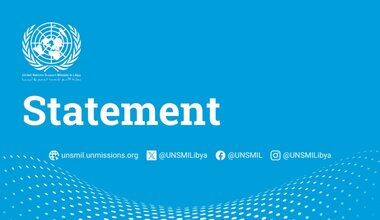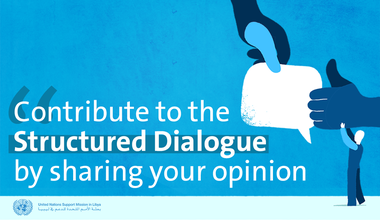IOM Launches Psychosocial Support Programme for Migrants at Detention Centres in Libya
IOM has begun to roll out a psychosocial support programme for migrants at detention centres, with the launch of a one-day recreational event at Tripoli’s Abu Salim detention centre.
“We do nothing but eat, drink and sleep, the only entertainment we have is talking to each other and that is very annoying, sometimes I wish I could die. However, today I feel alive again,” explained Esse (not her real name), who is at the Abu Salim centre with her two siblings aged three and one, following a day in which, for the first time, recreational activities were offered to the migrants at the centre. “Please come again,” the 20-year-old added after the sessions.
The one-day event on 21 January kick-started a wider IOM strategy, developed in coordination with the NGO Psychosocial Support Team (PSS), to provide support to women and children, who are particularly vulnerable. This support is being inaugurated in a number of detention centres, starting with the capital, Tripoli. There are an estimated 3,000 to 6,000 migrants at detention centres in Libya, who are all considered vulnerable.
Karolina Edsbacker, IOM Libya’s Protection Officer, explained that these activities, “do not only offer the migrants a break from the misery they face inside the detention centres, they also serve as a measure to build trust between the PSS team and the children in particular.”
“Providing psychosocial support for migrants inside detention centres is a pioneer project that has never been tried in Libya before,” according to Khaled Hamidi, Executive Manager of IOM’s implementing partner, the PSS team. “I’m very happy that we could try this out together with IOM,” he added.
Forty-one women and 19 children participated in the full day of activities in Abu Salim, which included dancing and singing, sports, games and drawing. The participants also received clothes and Sahleb (a traditional Libyan drink).
“The visit of the PSS team was successful from all points of view and their visit contributed to improving the mood of the detained ladies and their children who are very vulnerable. We are therefore emphasising that such visits should be planned on a monthly basis in all detention centres and we welcome and wish that IOM continues organizing such events and providing assistance,” Faraj Abuejila, Deputy Manager of Abu Salim detention centre, told IOM.
Many migrants at detention centres speak of difficult conditions throughout the migratory route in Libya, including harassment. Women and children are particularly vulnerable, which is why IOM is currently focusing on providing particular support for this group of migrants.
“After some time inside detention centres, the migrants feel as if there is no hope. Through these activities, we want to give back some hope, our aim is that they will see some light in all the darkness,” expressed Hamidi who visits the detention centres on a regular basis on behalf of IOM.
At the same time, IOM, together with other UN agencies and international and national organizations, is also looking into alternatives to detention with the aim to be able to better ensure the human rights and protection of migrants in Libya.
IOM’s psychosocial support is funded by the Bureau of Population, Refugees and Migration (PRM) of the United States Department of State under the project, Addressing Irregular Migration Flows and Upholding Human Rights of Migrants along the Eastern African Migration Route and North Africa (Noah phase VI).
For further information, please contact IOM Libya, Othman Belbeisi, Tel: +216 29 600 389, Email: obelbeisi@iom.int or Karolina Edsbacker, Tel +216 29 202 896, Email: kedsbacker@iom.int
 United Nations Peacekeeping
United Nations Peacekeeping UN
UN









